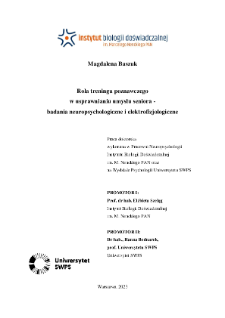
Obiekt
Tytuł: Rola treningu poznawczego w usprawnianiu umysłu seniora : badania neuropsychologiczne i elektrofizjologiczne : praca doktorska
Twórca instytucjonalny:
Instytut Biologii Doświadczalnej im. Marcelego Nenckiego PAN
Współtwórca:
Szeląg, Elżbieta : Supervisor ; Bednarek, Hanna : Supervisor
Wydawca:
Instytut Biologii Doświadczalnej im. Marcelego Nenckiego PAN
Miejsce wydania:
Opis:
292 pages : illustrations ; 30 cm ; Affiliation of the second supervisor: Uniwersytet SWPS ; Bibliography ; Summary in English
Instytucja nadająca tytuł:
Instytut Biologii Doświadczalnej im. Marcelego Nenckiego PAN
Typ obiektu:
Abstrakt:
High developed and developing countries are witnessing a significant increase in the percentage of elderly people, due to the progress of civilization, improvements in quality of life, and healthcare. Human aging is a complex and inevitable process of biological, psychological, and functional changes that occur over time. One aspect of this is cognitive aging, which leads to the deterioration of cognitive functions as one gets older. Hence, there is a growing demand for strategies and interventions aimed at improving the seniors life quality and supporting their cognitive abilities. Results from existing research indicate that appropriately structured cognitive training can be an effective method for enhancing cognitive abilities in the elderly, potentially delaying cognitive aging processes. The objective of present study was to assess the effectiveness of the Dr. Neuronowski® as a method designed to enhance the cognitive functions of seniors. This training program focuses on improving time perception, which also deteriorates with advanced age. The study examined whether Dr. Neuronowski® could enhance various cognitive domains such as: temporal information processing, memory, attention, and executive functions and whether there are parallel changes in the neural network 69 healthy seniors participated in this study and were randomly divided into 3 groups: A - the experimental group that participated in the Dr. Neuronowski® cognitive training (n=25); B - the active control group that underwent educational training (n=21); and C - the nonactive control group that did not participate in any training (n=23). Groups A and B underwent 24 training sessions, each session lasting 45 minutes, with a frequency of 3 meetings per week. The study design included three diagnostic measures: a pretest (before training), a posttest (immediately after the training completion to assess the effects directly), and a follow-up assessment (approximately 8 weeks after the training completion in order to evaluate maintenance of obtained effects). The use of an nonactive control group C aimed to control the repeated measure effect in the diagnostic procedures. Cognitive functions were examined using a number of neuropsychological tests. Additionally, electrophysiological procedures were used to understand the underlying neural mechanisms of the changes observed after the training. It was found that cognitive training improved time perception, short-term verbal and spatial memory, planning ability, and inhibitory control among the seniors. These behavioral changes were accompanied by changes at the electrophysiological level. A decrease in the amplitudes of mismatch negativity potential and a mental workload index was observed, indicating improvements in neural network efficiency. The behavioral outcomes were stable over time and persisted for two months after the training completion. In conclusion, the observed changes suggest that the Dr. Neuronowski® training program, based on its unique time perception component, can be an effective method for enhancing the cognitive functions of seniors.
Szczegółowy typ zasobu:
Identyfikator zasobu:
Źródło:
Język:
Język streszczenia:
Zasady wykorzystania:
Copyright-protected material. May be used within the limits of statutory user freedoms
Właściciel praw autorskich:
Publication made available with the written permission of the author
Digitalizacja:
Nencki Institute of Experimental Biology of the Polish Academy of Sciences
Lokalizacja oryginału:
Library of the Nencki Institute of Experimental Biology PAS
Dofinansowane ze środków:
Dostęp:
Kolekcje, do których przypisany jest obiekt:
- Repozytorium Cyfrowe Instytutów Naukowych > Kolekcje Partnerów > Instytut Biologii Doświadczalnej PAN
- Repozytorium Cyfrowe Instytutów Naukowych > Kolekcje Partnerów > Instytut Biologii Doświadczalnej PAN > Prace dyplomowe
- Repozytorium Cyfrowe Instytutów Naukowych > Kolekcje Partnerów > Instytut Biologii Doświadczalnej PAN > Prace dyplomowe > Prace doktorskie
- Repozytorium Cyfrowe Instytutów Naukowych > Piśmiennictwo
- Repozytorium Cyfrowe Instytutów Naukowych > Piśmiennictwo > Prace dyplomowe
Data ostatniej modyfikacji:
28 paź 2024
Data dodania obiektu:
27 lut 2024
Liczba pobrań / odtworzeń:
140
Wszystkie dostępne wersje tego obiektu:
https://rcin.org.pl./publication/276926
Wyświetl opis w formacie RDF:
Wyświetl opis w formacie RDFa:
Wyświetl opis w formacie OAI-PMH:
Obiekty Podobne
Wierciński, Mateusz
Fiołek, Krzysztof

 INSTYTUT ARCHEOLOGII I ETNOLOGII POLSKIEJ AKADEMII NAUK
INSTYTUT ARCHEOLOGII I ETNOLOGII POLSKIEJ AKADEMII NAUK
 INSTYTUT BADAŃ LITERACKICH POLSKIEJ AKADEMII NAUK
INSTYTUT BADAŃ LITERACKICH POLSKIEJ AKADEMII NAUK
 INSTYTUT BADAWCZY LEŚNICTWA
INSTYTUT BADAWCZY LEŚNICTWA
 INSTYTUT BIOLOGII DOŚWIADCZALNEJ IM. MARCELEGO NENCKIEGO POLSKIEJ AKADEMII NAUK
INSTYTUT BIOLOGII DOŚWIADCZALNEJ IM. MARCELEGO NENCKIEGO POLSKIEJ AKADEMII NAUK
 INSTYTUT BIOLOGII SSAKÓW POLSKIEJ AKADEMII NAUK
INSTYTUT BIOLOGII SSAKÓW POLSKIEJ AKADEMII NAUK
 INSTYTUT CHEMII FIZYCZNEJ PAN
INSTYTUT CHEMII FIZYCZNEJ PAN
 INSTYTUT CHEMII ORGANICZNEJ PAN
INSTYTUT CHEMII ORGANICZNEJ PAN
 INSTYTUT FILOZOFII I SOCJOLOGII PAN
INSTYTUT FILOZOFII I SOCJOLOGII PAN
 INSTYTUT GEOGRAFII I PRZESTRZENNEGO ZAGOSPODAROWANIA PAN
INSTYTUT GEOGRAFII I PRZESTRZENNEGO ZAGOSPODAROWANIA PAN
 INSTYTUT HISTORII im. TADEUSZA MANTEUFFLA POLSKIEJ AKADEMII NAUK
INSTYTUT HISTORII im. TADEUSZA MANTEUFFLA POLSKIEJ AKADEMII NAUK
 INSTYTUT JĘZYKA POLSKIEGO POLSKIEJ AKADEMII NAUK
INSTYTUT JĘZYKA POLSKIEGO POLSKIEJ AKADEMII NAUK
 INSTYTUT MATEMATYCZNY PAN
INSTYTUT MATEMATYCZNY PAN
 INSTYTUT MEDYCYNY DOŚWIADCZALNEJ I KLINICZNEJ IM.MIROSŁAWA MOSSAKOWSKIEGO POLSKIEJ AKADEMII NAUK
INSTYTUT MEDYCYNY DOŚWIADCZALNEJ I KLINICZNEJ IM.MIROSŁAWA MOSSAKOWSKIEGO POLSKIEJ AKADEMII NAUK
 INSTYTUT PODSTAWOWYCH PROBLEMÓW TECHNIKI PAN
INSTYTUT PODSTAWOWYCH PROBLEMÓW TECHNIKI PAN
 INSTYTUT SLAWISTYKI PAN
INSTYTUT SLAWISTYKI PAN
 SIEĆ BADAWCZA ŁUKASIEWICZ - INSTYTUT TECHNOLOGII MATERIAŁÓW ELEKTRONICZNYCH
SIEĆ BADAWCZA ŁUKASIEWICZ - INSTYTUT TECHNOLOGII MATERIAŁÓW ELEKTRONICZNYCH
 MUZEUM I INSTYTUT ZOOLOGII POLSKIEJ AKADEMII NAUK
MUZEUM I INSTYTUT ZOOLOGII POLSKIEJ AKADEMII NAUK
 INSTYTUT BADAŃ SYSTEMOWYCH PAN
INSTYTUT BADAŃ SYSTEMOWYCH PAN
 INSTYTUT BOTANIKI IM. WŁADYSŁAWA SZAFERA POLSKIEJ AKADEMII NAUK
INSTYTUT BOTANIKI IM. WŁADYSŁAWA SZAFERA POLSKIEJ AKADEMII NAUK


































